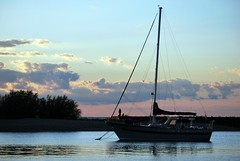Traduzione by DANILA FORESTI , volontaria di English Gratis. Il testo originale è tratto da una pagina del sito inglese di Wikipedia ed è disponibile nel rispetto della licenza Creative Commons Attribution 2.5 Creative Commons License photo credit: dcbprime
The Open Boat
“The Open Boat” is a short story by American author Stephen Crane (1871–1900).
“The Open Boat” (La Scialuppa) è un racconto scritto dall’autore Americano Stephen Crane (1871-1900).
First published in 1897, it was based on Crane’s experience of surviving a shipwreck off the coast of Florida earlier that year while traveling to Cuba to work as a newspaper correspondent.
Publicato per la prima volta nel 1897, il romanzo breve rispecchia l’esperienza dello stesso Crane, sopravvissuto ad un naufragio, al largo della costa della Florida, all’inizio di quell’anno, mentre era diretto a Cuba per lavorare come inviato di un giornale.
Crane was stranded at sea for thirty hours when his ship, the SS Commodore, sank after hitting a sandbar.
Crane rimase in balia del mare per trenta ore quando la sua nave, la Commodore, colò a picco dopo essersi incagliata in un banco di sabbia.
He and three other men were forced to navigate their way to shore in a small boat; one of the men, an oiler named Billie Higgins, drowned after the boat overturned.
Lo scrittore ed altri tre uomini dovettero navigare verso riva su una scialuppa di salvataggio; uno dei tre naufraghi, un addetto alle macchine di nome Billie Higgins “il Macchinista”, morì travolto dalle ondate dopo che l’imbarcazione si capovolse.
Crane’s personal account of the shipwreck and the men’s survival, titled “Stephen Crane’s Own Story”, was first published a few days after his rescue.
Il resoconto personale di Crane circa il naufragio e la sopravvivenza degli uomini, intitolato “Stephen Crane’s Own Story” fu pubblicato pochi giorni dopo il suo salvataggio.
Crane subsequently adapted his report into narrative form, and the resulting short story “The Open Boat” was published in Scribner’s Magazine.
Successivamente, Crane trasformò la sua cronaca in opera narrativa ed il racconto che ne risultò “The Open Boat” venne pubblicato sulla “Scribner’s Magazine”.
>>> The story is told from the point of view of an anonymous correspondent, Crane’s fictional doppelgänger*, and the action closely resembles the author’s experiences after the shipwreck.
La storia viene narrata dal punto di vista di un anonimo corrispondente, sosia immaginario di Crane, e l’azione ricorda, intrinsecamente, le esperienze dell’autore a seguito del naufragio.
A volume titled The Open Boat and Other Tales of Adventure was published in the United States in 1898; an edition entitled The Open Boat and Other Stories was published simultaneously in England.
Nel 1898, negli Stati Uniti, venne pubblicato un volume dal titolo “The Open Boat and Other Tales of Adventure”; contemporaneamente, in Inghilterra, venne data alle stampe un’edizione intitolata “The Open Boat and Other Stories”.
Praised for its innovation by contemporary critics, the story is considered an exemplary work of literary Naturalism, and is one of the most frequently discussed works in Crane’s canon.
Elogiato dai critici contemporanei per il suo approccio innovativo, il racconto viene considerato come un’opera esemplare di Naturalismo letterario, ed è uno dei più sovente analizzati testi nel canone di Crane.
It is notable for its use of imagery, irony, symbolism, and the exploration of such themes as survival, solidarity, and the conflict between man and nature. H. G. Wells considered “The Open Boat” to be “beyond all question, the crown of all [Crane’s] work”.
Esso è notevole per uso del linguaggio, ironia, simbolismo e per l’approfondimento di temi come sopravvivenza, solidarietà e conflitto tra uomo e natura. H. G. Wells (Herbert George – 1866/1946) giudicò “the Open Boat” come: “al di là di ogni discussione, il vertice di tutto il suo lavoro (di Crane)”.
* Un doppelgänger è una copia spettrale di una persona vivente.



